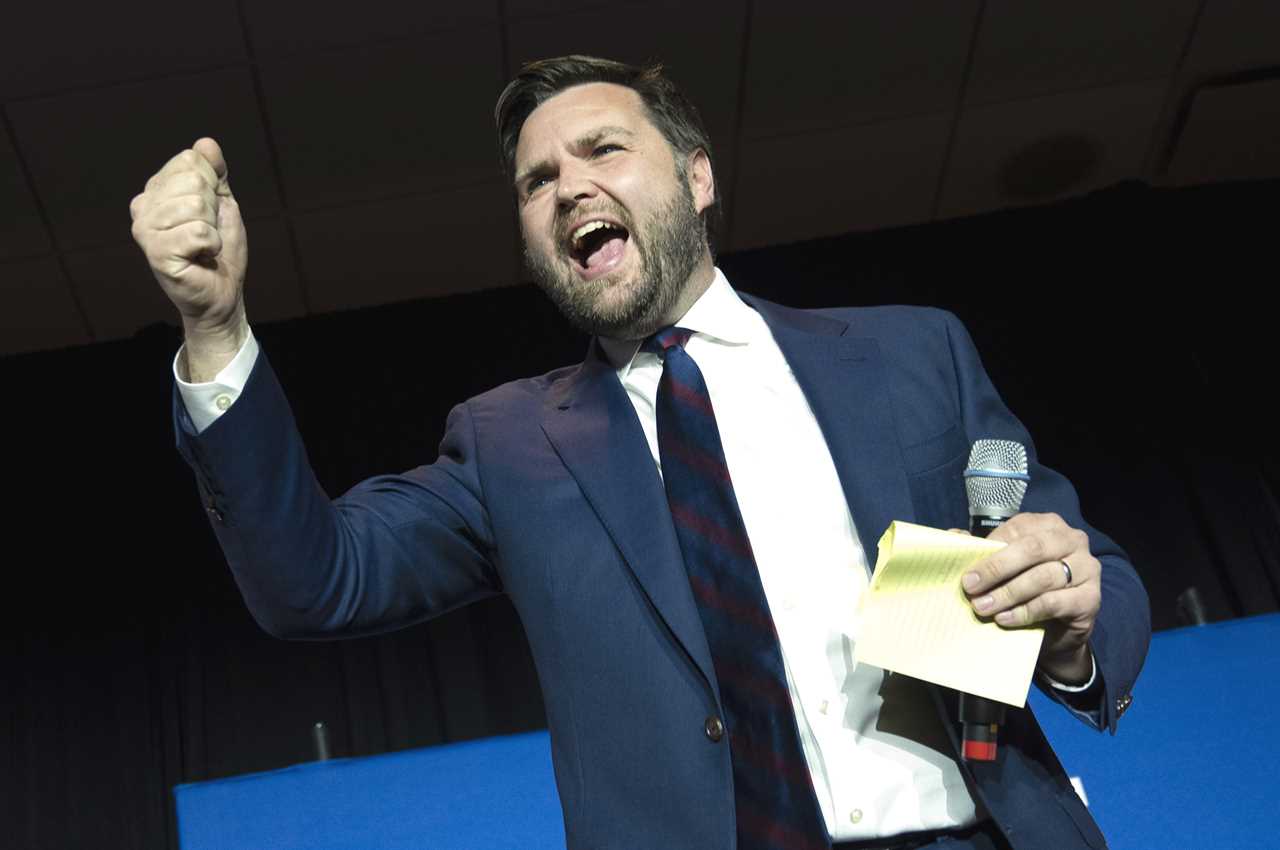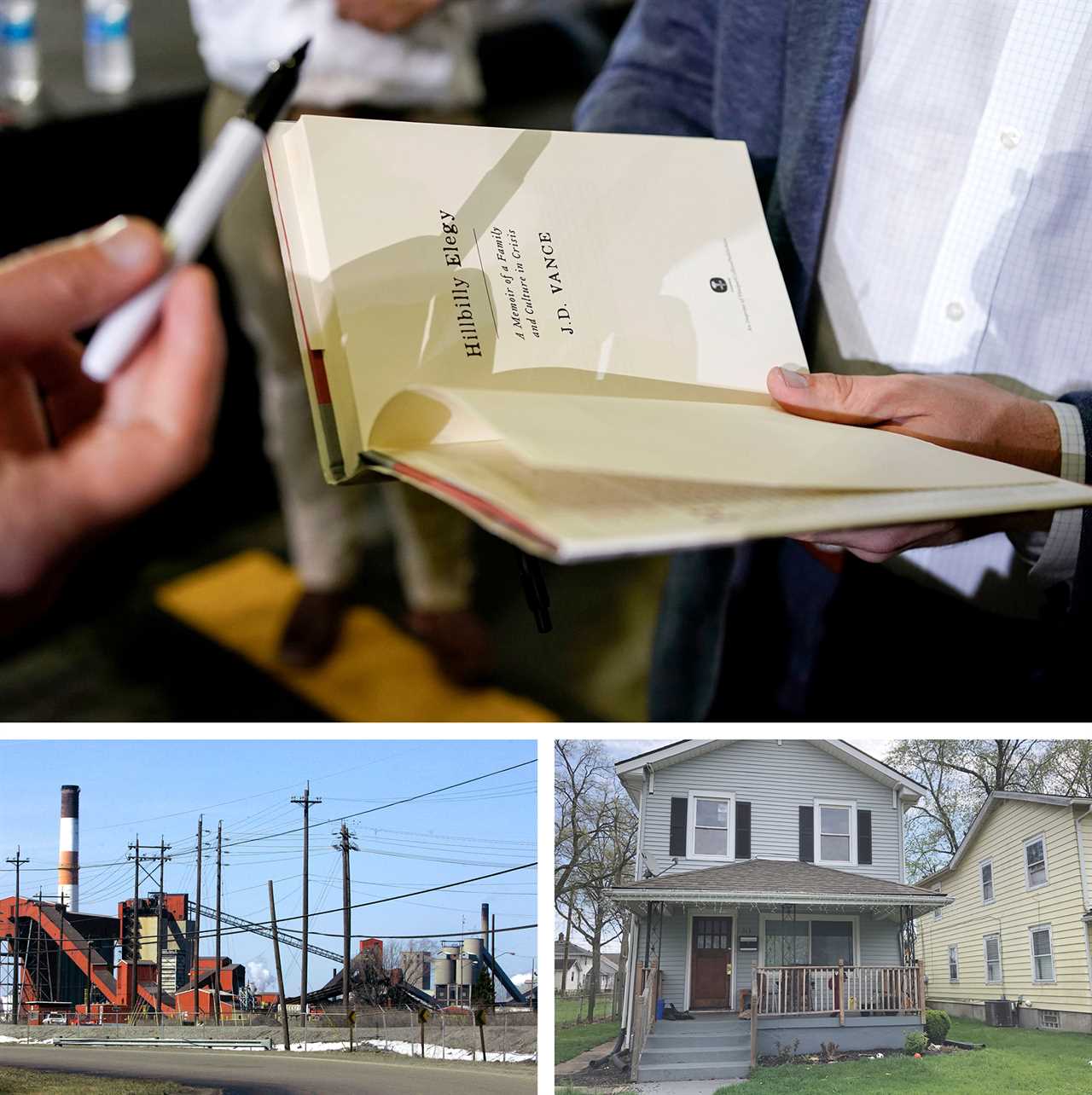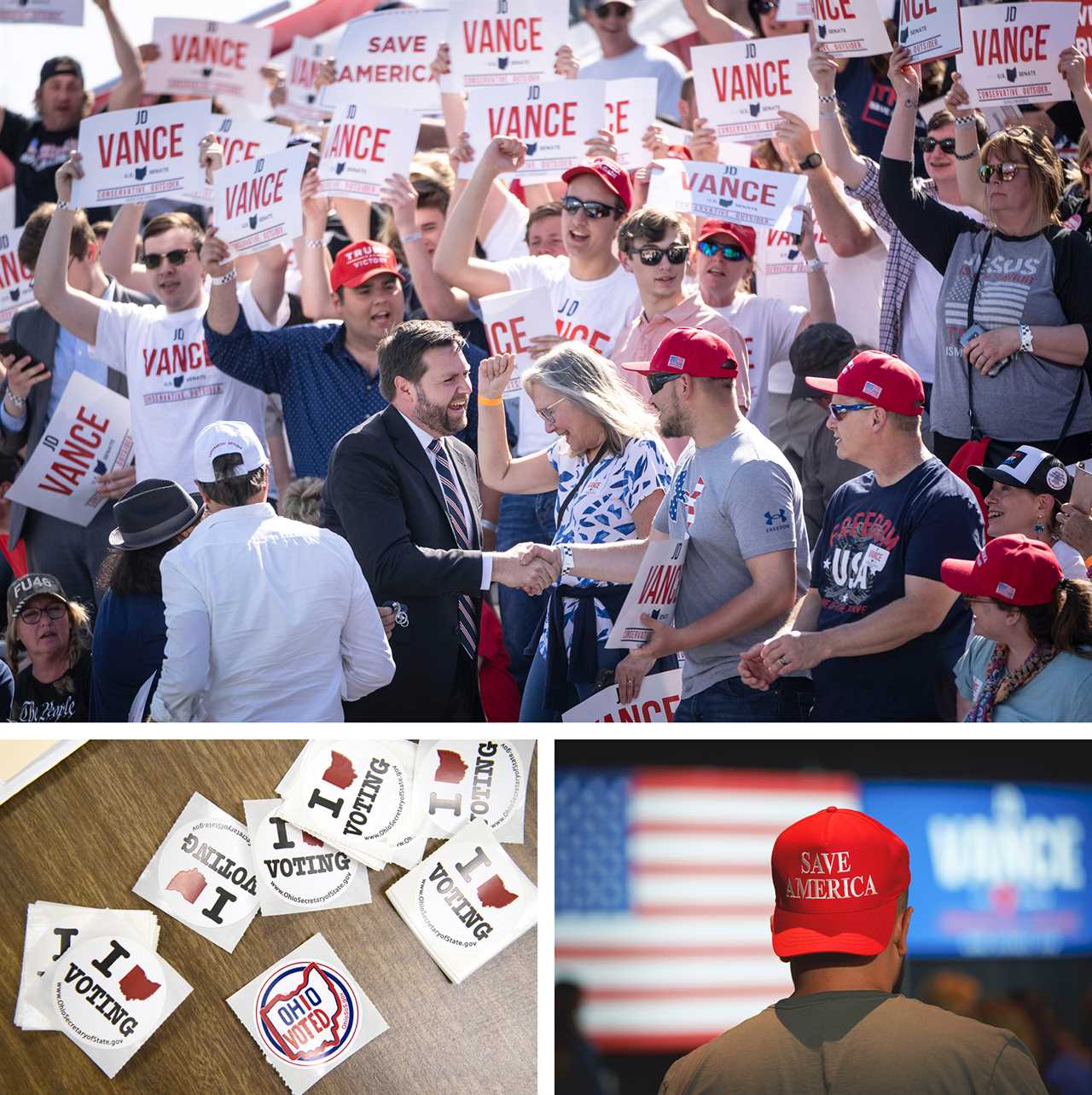
Hillbilly Elegy was published in the summer of 2016. It became a New York Times bestseller and a cultural sensation — and it made a celebrity of sorts out of J.D. Vance. He was for a time one of the main explainers to those on the left of what was to them the inexplicably successful presidential candidacy of Donald Trump. In the last six years, though, the title has turned into but a piece of Vance’s resume, a part of a quick clause that says who he is — Yale Law, venture capitalist, author of …
In the wake, though, of Vance’s victory this week in the wild and tightly contested Republican Senate primary in Ohio — one that makes him a favorite to get elected to the U.S. Senate come November — Hillbilly Elegy is newly relevant. And while legions of pundits and commentators focused the last few days on Trump’s role in boosting Vance, Silas House went back to the book.
House, the Appalachian Studies chair at Berea College in Kentucky, one of the premier thinkers in and about the South and a bestselling writer in his own right, considers Hillbilly Elegy offensive and inauthentic. He sees it, and saw it from the start, as not a memoir but a treatise that traffics in ugly stereotypes and tropes, less a way to explain the political rise of Trump than the actual start of the political rise of Vance. And it’s as meaningful now as it was when it first came out, House believes, because it helps show what kind of candidate Vance has been and what kind of senator he might be.

“He’s dangerous. So is his book,” House said about Vance in a Tuesday night tweet.
“When I criticize it, sometimes conservatives accuse me of wanting to keep it out of readers’ hands,” he told me Thursday. “I want to make it clear that I am in no way saying the book should be banned or anything remotely like that. But I am saying that I hope people who read it seek historical and cultural context. Every family story has value, but I wish he’d told that story without generalizing an entire place and people to fit his agenda.”
This interview has been edited for length and clarity.
Michael Kruse: Why is he dangerous and why is his book dangerous?
Silas House: It’s a dangerous book because it’s a treatise in disguise. Lots of times when I would voice my opposition to the book, well-intentioned people, often liberal people, would say, “But it’s a memoir, it’s his family story — how can you negate his own story?” My response to that is I don’t negate the family story, and I think that if it had just been a memoir, it would be a powerful piece of writing and it would be his own proof. But the problem is it is woven through with dog whistles about class and race, gender. And if your ears are attuned to those dog whistles, you know exactly what he’s saying. If you’re not, then it can read like a heartwarming rags-to-riches story. And everything that we’ve learned since the book came out sort of proves that it was just laying the groundwork for this political career.
There’s a lot of talk right now about how he was so anti-Trump, and now, of course, he’s riding on the Trump bump and all that. But even if he was anti-Trump from the beginning, he was always pushing ideas that Trumpers really latch onto — like the idea of welfare queens, or this idea that people in Appalachia just don’t want to work, et cetera. One of the most troubling things to me about the book is that it talks a lot about unemployment and poverty, domestic violence, the opioid crisis, but it never gives you context for why those things exist the way they do in Appalachia. For anybody who really knows the region, it’s a deeply troubling book because it’s so misleading, and it lacks so much context, and he knew exactly what he was doing.
Kruse: Liberals or other people sort of aghast by the rise of Trump, looking for explanations, seemed to find some of what they were looking for in that book — but in your estimation, from the get-go, it wasn’t really that at all. It was the beginning of a national political rise of Vance’s own?
House: Absolutely. The “explanation” was these people are just stupid, these people are just lazy, these people aren’t pulling themselves up by their bootstraps — without mentioning that they were not born with any boots to begin with. And so the whole thing’s political in every way. The whole reason so many people responded to that book to help them understand the rise of Trump is because in a way it gave them exactly what they were looking for: easy answers instead of really complicated historical answers. And that’s why I think it’s so disingenuous and dangerous because it’s not true. It’s full of untruths, intentionally manipulative stories.
Kruse: Did you read it this way the first time you read it?
House: I read it as soon as it came out, even before it had become just a huge book, because I was raised really close to where his grandparents are from. And as soon as I read it, my antenna’s going up all over the place, because we’re not even three or four pages in and he’s already generalizing. For instance, there’s a scene where he talks about his uncles, who are these drunks who fight everybody and they beat their wives, and then he calls them the embodiment of the Appalachian man. Well, as an Appalachian man, that’s deeply troubling to me, because that doesn’t embody Appalachian masculinity as I know it. It does embody the stereotypes of Appalachian masculinity over the last 150 years of media. And that’s sort of what I mean. It just sort of presses the buttons that are already there and made people feel really satisfied, in that it’s sort of like, “Oh, well, I knew this all along, and now somebody is solidifying it for me.”

Kruse: Do you think he wrote that book explicitly as a potential political jumping-off point? Or did he see in the reaction to it political opportunity?
House: The first time I read it, it read like the launching of a political campaign to me. As someone who has read a lot of political memoirs, it felt that way. It’s an origin story, and to some degree it’s a superhero origin story that’s terribly condescending to the rest of his family. The gist of it is, “Well, I’m the one who made it out, I’m the one who’s successful. I had the same sort of opportunities they did, but I did it, and they didn’t.”
Kruse: Why, if Vance was writing that book in some sense as an almost disguised political beginning, did he spend chunks of the early Trump era saying the things he said about Trump?
House: I think because he’s a total opportunist, and when he was saying that, lots of people were saying that, and I feel like he was sure that Trump was just a blip that would go away and he didn’t understand the way that Trump appeal was going to go so wide.
Kruse: Given the results in Ohio this week, how do you think people should be rereading and reconsidering Hillbilly Elegy?
House: I guess it depends on their political persuasion. I think a lot of conservative people read that book and they really responded to the rags-to-riches aspect of it. I think a lot of liberal people read it and had a lot of their suspicions confirmed. Lots of times a book is what readers bring to it themselves.
Let’s say somebody’s on the fence about voting for Vance. I would hope they would read that book and see the dog whistles and see the lack of complexity, see the generalizations, see the outright falsehoods that are throughout the book. I mean, lots of times in the book when he’s talking about Appalachia, it’s almost like he’s never been to Appalachia. For instance, early on in the book, he says that in Appalachia when there’s a funeral everybody stops their car gets out of their car and stands on the side of the road. Well, I’ve lived in Appalachia my whole life until the past three years, and I’ve never seen that happen. What does happen is people pull over sort of to the side of the road, the same way you would if an ambulance was coming, and they stop as a moment of respect. Nobody gets out of their car.
And I think it’s so telling that this book was pushed as an Appalachian narrative when this man is two generations removed from Appalachia. This is a Rust Belt story, but Appalachian stories, Appalachian literature, is its own genre. In early cinema, one of the most popular movie genres was “hillbilly movies.” We still have a genre of horror that’s very popular called “hillbilly horror.” So there’s a market there, in a different way, for the idea of the hillbilly, more than there is for the idea of the Rust Belt. So that alone is manipulative in that it’s sold as an Appalachian story or a hillbilly story, and if you read the book, you realize that hardly any of it is set in Appalachia. He’s saying, I guess, that generationally you can’t escape Appalachia, because here he is, his grandparents left there when they were very young, his mother never lived there, he never lived there, and suddenly, after the book came out, he’s on every news show as the representative of a region that he barely knows.

Kruse: And why do you think he did that? Was there something calculated or beneficial about labeling it that way rather than as the Rust Belt?
House: Think about all of the examples of hillbilly life that we know in the media, whether it be “Deliverance” or “The Beverly Hillbillies” or “Ozark.” It’s a constant in media over the last 150 years. I can’t really think of Rust Belt narratives like that, that are popular in the American consciousness. So I think he did it just because there was that market that is very firmly there and it’s a part of American consciousness. It’s one of the biggest selling nonfiction books in the last, I don’t know, 30 or 40 years, so it worked.
Kruse: I guess the question is did it work as a piece of political fuel?
House: I read it that way because it’s my job to read any piece of literature or view any media coming out of the region. It’s my job to analyze it and think about what are the intentions of this piece? What is the historical and cultural context of this piece of media? Are some of these stereotypes just coming out of ignorance, or are they intentional?
Kruse: If this was, from the get-go, even in the mind of Vance, a political launching pad, it probably wasn’t going to be a successful political launching pad until April 15, when Trump endorsed him. I think it’s fair to say coming out of the results in Ohio that Vance was not going to win without that. It took the Trump tap to take him and his origin story and his sort of newfound populist rhetoric across the finish line. Is there anything that was in that book that helped him win as opposed to just the Trump endorsement?
House: The first thing of course is it made him kind of a household name for a whole lot of people. It’s a very popular book, and it put him on practically every news show, and at the time he became the representative for quote-unquote Trump country. He was the expert on Trump country. He was hoping to explain why this was happening for people who have no understanding of rural America, but think they do, who have no context for it. And when he wrote the book, he didn’t know he was going to need that Trump tap, but he did know that he would need this origin story. He did know that we love a rags-to-riches story. There’s not hardly anything Americans love more than that. Again, I do not know for sure, but to me it just reads like a political launching pad book, and it’s certainly a treatise more than it is a memoir.

Kruse: And by treatise you mean exactly what in this context?
House: An orchestrated political statement.
Kruse: And he’s not trying to explain the rise of Trump so much as he’s trying to start his own political rise?
House: Yes. And I think that a lot of Republicans and probably many who advised Trump at the time were like, “These are the issues we’ve got to latch onto. We have to latch onto rural dissatisfaction, we have to latch onto the employment numbers, we have to latch onto welfare issues, et cetera.”
Kruse: So, in some weird way, Vance actually is not some kind of phony johnny-come-lately to the Trump style of politics. Vance was there before many people, most people, kind of even recognized he was there.
House: Absolutely. I think that’s one of the main things that I would want to put a fine line under. He, ever since Hillbilly Elegy, has always embodied Trumper ideas, even before there was such a thing.
Kruse: So, just to return to the original contention, why does all of this make Vance and his book dangerous, as we look forward to the general election campaign against Tim Ryan in Ohio?
House: It’s dangerous because there’s such a lack of complexity in the book in a time when the national conversation lacks more and more nuance. There’s no nuance in the book. There’s a lot that’s false and intentionally misleading, and I always think that’s really dangerous when there’s intentional misinformation being shared. And I think he’s dangerous because he embodies all of that. And it seems to me that he’s willing to do whatever it takes to rise. And I can think of nothing more dangerous in a politician than that.
----------------------------------------
By: Michael Kruse
Title: ‘He’s Dangerous. So Is His Book.’
Sourced From: www.politico.com/news/magazine/2022/05/06/jd-vance-book-dangerous-00030374
Published Date: Fri, 06 May 2022 03:30:00 EST






